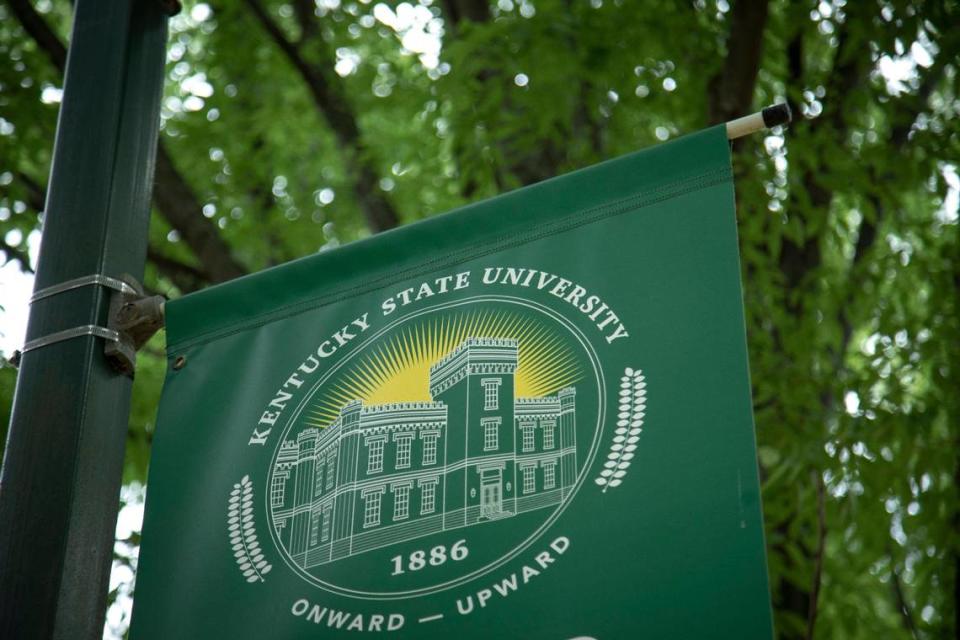Beleaguered KSU will need a bailout by next April to remain solvent, lawmakers told

Financially beleaguered Kentucky State University will need emergency assistance by next spring to remain solvent, the school’s new chief financial officer told the Kentucky’s legislature’s interim joint budget committee on Friday.
“We have been doing cash-flow projections,” Greg Rush told state lawmakers. “We are confident we’re going to be able to make it to January. We believe we can make it through April. But at this point ... we would not have enough cash to operate past April.”
No specific sum was identified Friday. Lawmakers begin writing the next two-year state budget in January.
KSU announced in August that it faces a $15 million budget shortfall due to a stack of unpaid bills and other mounting debts, a ballooning payroll and several years of poorly managed spending that outpaced revenue.
Gov. Andy Beshear placed KSU under state oversight following the sudden resignation July 20 of President M. Christopher Brown II, who previously had the public support of the KSU Board of Regents. An independent audit of the school’s finances is underway.
KSU is an historically Black college in Frankfort. Its budget this year is $49.9 million. Of that, $27.1 million comes from the state’s General Fund and $16.3 million comes from tuition and fees from its student body of about 2,200, according to KSU budget documents.
Sen. Chris McDaniel, chairman of the Senate budget committee, expressed concern with the school’s history of financial problems and previous state oversight, which he said has won it different treatment than Kentucky’s other public universities. KSU got budget increases when other state universities took cuts, McDaniel said.
In fiscal year 2017, the state gave KSU $26.7 million, and the school produced 401 degrees for an average cost of $66,000 per degree, McDaniel said. Two years later, the state gave KSU $25.2 million, and the school produced 205 degrees, for an average cost of $123,000 per degree, he said.
“So the financial case to be made is there should not be a Kentucky State,” said McDaniel, R-Taylor Mill. “That we should give these kids full tuition, send them to the University of Kentucky, send them to the University of Louisville. But there are larger cultural implications at play as well.”
Also on Friday, an attorney for Chandee Felder, former staff representative on the KSU Board of Regents, said she is preparing to file a whistle-blower lawsuit against the school because of her firing earlier this month.
Felder, who was an administrative assistant at KSU, publicly criticized how her fellow board members were responding to the school’s financial problems.
Specifically, in a Sept. 16 article in the State Journal, the Frankfort newspaper, Felder disputed the board’s public claims that it did not know KSU was in trouble until recently. She said the facts were plain to board members more than a year ago. In a letter to Beshear, she urged him to replace the entire board — including her.
KSU’s human resources director sent Felder a letter dated Sept. 16 firing her for violating the school’s rules on confidential information and conflict of interest.
Felder was fired not because she did anything wrong as a KSU employee but because she angered KSU leaders as a dissident board member, said her attorney, Michael Augustus of Louisville.
“Dissenting voices on a board, to me, are a sign of a healthy environment,” Augustus said. “The Board of Regents, just like any other board over a private corporation or a university, is supposed to provide oversight and make sure the organization’s mission is being followed and money is not being misspent.”
In a prepared response on Friday, KSU said of Felder: “Kentucky State University is under scrutiny with detailed financial and organizational evaluations. Separating individuals from employment is no small matter, and in this climate such actions are well-considered and decisions are based on merit.
“Any claims to the contrary are incorrect,” KSU continued. “Kentucky State University will not respond to threat of potential litigation, but will instead use the proper venue to address the matter.”
The KSU Faculty Senate discussed a resolution on Friday that would ask the Kentucky Council on Postsecondary Education — the agency that is providing state oversight at the school — to also examine the Board of Regents and administration during its review.
The Senate postponed a vote on its resolution until its next meeting.
Herald-Leader staff writer Monica Kast contributed to this report.

 Yahoo Finance
Yahoo Finance 